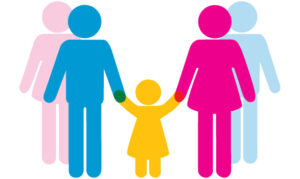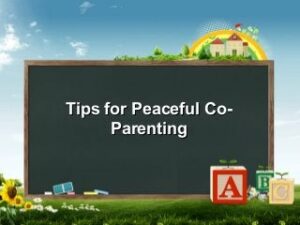Co-parenting is becoming more and more popular these days. But what is it, exactly? Co-parenting is when two parents who are no longer together share the responsibilities of parenting their child or children. This can be done in a number of ways, depending on the situation and the parents involved. In this blog post, we will discuss the benefits of co-parenting, how to do it successfully, and some of the challenges you may face along the way.
Contents
What Is Co-parenting?

Co-parenting is when two parents who are no longer together share the responsibilities of parenting their child or children. This can be done in a number of ways, depending on the situation and the parents involved. For example, if one parent has sole custody while another has visitation rights only once per month. Then they would not need to co-parent in the same way as two parents who share 50/50 custody would.
Who Does Co-parenting?
Co-parenting is a term used to describe parenting arrangements where both parents are actively involved in raising their children together. Even though they might no longer be romantic partners or living under the same roof (or even country). It’s often done out of necessity when one parent has primary custody. But there are many other situations where this could work well too. Like being stationed overseas for military service or going back home after college graduation.
Co-parenting can be done by anyone who is interested in raising their child together with the other parent. Even though they’re no longer romantically involved (or living under the same roof).
Benefits of Co-Parenting

There are many benefits to co-parenting, including:
Communication and Cooperation
When both parents are on the same page and working together towards a common goal. It sets a good example for their child. Children learn communication skills, conflict resolution strategies, and how to get along with others. When they see their parents working together in this type of arrangement.
Consistency
Another benefit is consistency across both households which helps children feel safe and secure. Because there are predictable rules for behavior no matter where they go or who they’re with (at least when it comes to these two people).
Healthy Relationship With The Other Parent
Co-parenting allows children to maintain a healthy relationship with both parents even if they’re no longer together romantically or otherwise. This also helps them learn how important relationships are outside of just family members like friends, teachers, clergy members, etc.
Healthy Relationship with Both Parents
This is something that doesn’t always happen when one parent has full custody and the other only gets visitation rights once per month. Children need time to bond with both parents in order for them as individuals to develop properly emotionally, psychologically, intellectually, etc. So if they don’t get enough contact because their dad lives across town or works long hours then there’s going to be an imbalance in this area of development because only mom will have been taking care of them all along.
Types Of Co-parenting

There are different ways that co-parenting can be done, depending on the situation and the parents involved. Here are three common types of co-parenting:
1) Parallel Co-Parenting
This is when both parents remain completely separate from each other after the split. They have no contact whatsoever and communicate only through their children. This type of co-parenting can be difficult because it’s hard to predict what the child will say or do when they’re with one parent and then the other. It can also be difficult for the child to keep up with two separate households.
2) Joint Co-Parenting
This is when both parents share parenting responsibilities equally. They make decisions together, communicate directly with each other, and generally try to get along. This type of co-parenting can be difficult because it’s hard to agree on everything and sometimes one parent may feel like they’re doing more work than the other.
3) Collaborative Co-Parenting
This is a newer form of co-parenting that has been growing in popularity lately. It’s when both parents work together to co-parent their child. They communicate directly with each other, make decisions together, and generally try to get along. This type of co-parenting can be very beneficial for the child because it allows them to have two healthy and positive relationships in their life.
Challenges of Co-Parenting

There are many different challenges that can arise when co-parenting. Here are some common ones you may encounter:
Scheduling and Coordination
Making sure both parents’ schedules line up for things like doctor’s appointments, school events, extracurricular activities or anything else that involves the child takes a lot of work! It’s often hard to find a time that works for everyone.
Co-Parenting Relationship Issues
If the parents are not getting along, it can be very difficult for the child to witness and can lead to a lot of stress and conflict in their life. It’s important that both parents try to get along as best they can for the sake of their child. If you’re struggling with this, consider joining a co-parenting support group or seeking counseling from an objective third party such as a therapist who specializes in family issues like divorce custody arrangements and parenting after divorce etcetera.
Decision-Making Issues
Sometimes one parent will want to make all the decisions about what happens in the child’s life. And this can cause tension between the parents. It’s important to come up with a system where both parents have an equal say in all decisions that affect the child.
Money Matters
If one parent is paying child support or alimony. It can be difficult for them to also pay for things like extra-curricular activities, school lunches, and supplies. It’s important that both parents work together to come up with a plan for how they will pay these expenses so no one feels left out of their child’s life because they can’t afford it.
Sharing Time With Your Child
It is often hard for parents who have split custody arrangements not to see their children as much as they would like. It’s important that both parents work together to create a schedule where each parent gets an equal amount of time with the child, or at least close enough so no one feels left out or cheated on how much time they spend with their little ones!
Drawbacks Of Co-parenting

Co-parenting can be a great way for both parents to remain active in their child’s life. But it also has its drawbacks.
- One of the biggest challenges is that it can be difficult to maintain a healthy relationship. Even when you’re no longer romantically involved. This is often due to the fact that there are so many emotions and history between the two of you that it’s hard to move past them.
- Another issue that can arise is communication. When you’re co-parenting, you need to be able to talk about problems calmly and clearly when they come up. but this can be difficult if there’s already a lot of tension between the two of you.
- Compromise is another key factor in co-parenting that must be worked on if you want it to work.
How To Do Co-Parenting Successfully?

- First, you need to find a schedule that works for everyone involved. This means figuring out what days/times are best for both parents so they can see their child without interfering with work or school. It may take some trial and error but eventually, you’ll find the right balance between family time together as well as separate parenting duties separately from each other that works best overall.
- Don’t be afraid to ask friends and relatives if they have any suggestions too because sometimes someone else might have an idea that hadn’t occurred to you yet!
- You also need good communication skills in order for this type of arrangement to work out well over time. This means being able to talk about problems calmly and clearly when they come up, as well as compromise on things like holidays or weekend visits by either parent if necessary.
- Don’t expect everything to always go smoothly. Because there will be bumps along the way but being able to talk together helps make those less frequent occurrences more manageable.
- It’s important not just with co-parenting. But in life as a whole that children have both parents actively involved with them. This means spending time playing games or doing other activities together when possible and having regular conversations with both parents about school, friends, plans for the future, etc. It’s not always going to be easy. But it will definitely benefit your child in the long run!
There’s no one answer to this question. Since every family is different and will have its own set of challenges and needs. However, there are some general rules that most people find helpful when trying to figure out what works best for them.
Tips For Co-Parenting

There are many different ways to co-parent successfully with your ex. Here are some tips and tricks that may help you along the way:
Find A Schedule That Works For You Both
The first thing you need is time management. Because both parents have different jobs and schedules so it’s important not to expect too much from each other at once. Especially if there are children involved who might need extra attention during certain periods of their lives.
It can be difficult finding an arrangement where both parents get enough time with their children. Without having too much conflict between them. Some ideas for schedules include alternating weeks between parents’ homes, one week on and one week off at each home. Or even just keeping it simple with every other weekend spent at mom’s house. While dad stays home during those days (and vice versa). You might also consider having partial custody arrangements. Where each parent gets certain days of the week to take care of their child while they’re at work or school.
Communicate With Each Other About Any Changes
It is important that both parents communicate with each other about any changes in their child’s life. This includes things like doctor appointments, school events, and extracurricular activities so everyone knows what is going on at all times and can be as involved in their child’s life as possible.
Stay Committed
In order for co-parenting to work well, there needs to be a shared commitment between both parties involved. Even if they’re not romantically partners anymore (or living under the same roof). It’s often necessary when one parent has primary custody but there are many situations where this might work well too. Like being stationed overseas for military service or going back home after college graduation.
Keep Your Child Out Of Conflicts
It’s important not to let your ex get caught up in emotions when they’re talking about the other parent or putting them down in any way, shape form because children are very sensitive creatures who pick up on everything that happens around them. If you’re having problems with your co-parenting situation, try talking to a professional counselor who deals specifically with these issues so they can help you work through any issues before things escalate into something more serious.”’
A Word From Therapy Mantra
Your mental health — Your psychological, emotional, and social well-being — has an impact on every aspect of your life. Positive mental health essentially allows you to effectively deal with life’s everyday challenges.
At TherapyMantra, we have a team of therapists who provide affordable online therapy to assist you with issues such as depression, anxiety, stress, workplace Issues, addiction, relationship, OCD, LGBTQ, and PTSD. You can book a free therapy or download our free Android or iOS app.


